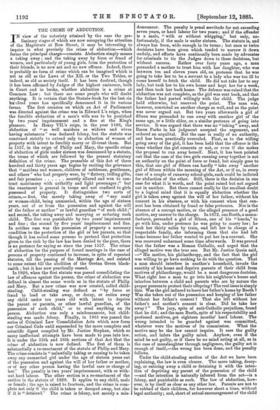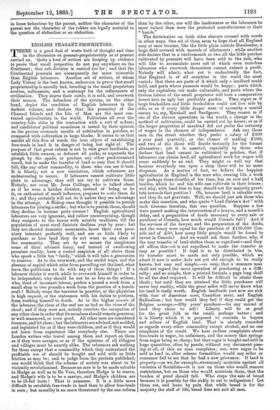THE CRIME OF ABDUCTION.
forms. The first occasion on which an Act of Parliament was directed against the crime was in Edward L's reign, when the forcible abduction of a man's wife was to be punished by two years' imprisonment and a fine at the King's pleasure. In Henry VIL's reign, in the year 1486, the abduction of " as well maidens as widows and wives having substances " was declared felony, but the statute was construed strictly to extend only to abduction of women of property with intent to forcibly marry or ill-treat them. But in 1557, in the reign of Philip and Mary, the specific crime of abduction of girls under sixteen was denounced by a statute, the terms of which are followed by the present statutory definition of the crime. The preamble of this Act of three hundred and thirty years ago begins by reciting the grievance that " maidens and women, children of noblemen, gentlemen, and others " who had property were, by " flattery, trifling gifts, and fair promises secretly allured and won to con- tract matrimony with unthrifty and light personages ;" but the enactment is general in terms and not confined to girls possessed of property. It distinguishes two sorts of crimes,— first, the merely taking away of " any maid or woman-child, being unmarried, within the age of sixteen years, out of or from the possession and against the will of the father or mother " or lawful guardian " of such child ;" and second, the taking away and marrying or seducing such child. The first was punishable by two years' imprisonment and fine ; the second by five years' imprisonment and fine. In neither case was the possession of property a necessary condition to the protection of the girl or her parents, so that though it has suited some persons to pretend that protection given to the rich by the law has been denied to the poor, there is no pretence for saying so since the year 1557. The crime of abduction for the purpose of forced marriage in the case of persons of property continued to increase, in spite of repeated statutes, till the passing of the Marriage Act, and existed to some extent till the abolition of the Gretna Green black- smith ; but it has now practically ceased.
In 1828, when the first statute was passed consolidating the law of offences against the person, the crime of abduction was defined in almost the same words as in the statute of Philip and Mary. But a new crime was now created, called child- stealing. Child-stealing was defined as " by force or fraud to lead or take away, or decoy, or entice away any child under ten years old with intent to deprive the parent or parents, or other lawful guardian, of the possession of such child," or to steal anything on its person. Abduction was only a misdemeanour, but child- stealing was made felony. Finally, in 1861 was passed the series of Criminal Law Consolidation Acts which now form our Criminal Code until superseded by the more complete and scientific digest compiled by Mr. Justice Stephen, which so many ineffectual attempts have been made to pass into law. It is under the 55th and 56th sections of that Act that the crime of abduction is now defined. The first of them is substantially a re-enactment of the statute of Philip and Mary. The crime consists in " unlawfully taking or causing to be taken away any unmarried girl under the age of sixteen years out of the possession and against the will of her father or mother, or of any other person having the lawful care or charge of her." The penalty is two years' imprisonment, with or with- out hard labour. The other section is a re-enactment of the section in the statute of 1828. It applies to any child, male or female ; the age is raised to fourteen, and the crime is com- plete not only if the child is taken or decoyed away, but also if it is " detained." The crime is felony, not merely a mis- demeanour. The penalty is penal servitude for not exceeding seven years, or hard labour for two years ; and if the offender is a male, " with or without whipping," but only, un- fortunately, if the male is under sixteen. The statute is, and always has been, wide enough in its terms ; but once or twice decisions have been given which tended to narrow it down unduly, and efforts have continually been made by advocates for criminals to tie the Judges down to these decisions, but without success. Rather over forty years ago, a man persuaded a mother to trust him with her daughter, who was between ten and eleven years old, on pretence that he was going to take her to be a servant to a lady who was too ill to come herself to fetch the child. He did not take her to any lady, but took her to his own house and kept her for a week, and then took her back home. The defence was raised that the abduction was not complete, as the girl was sent back, and that the father had parted willingly with the child. The judge held otherwise, but reserved the point. The man was, however, convicted on another charge as well, and so the point was never argued out. But two years afterwards a girl of fifteen was persuaded to run away with another girl of the same age, or a little older, on a similar pretence of going into service. It was argued that there was no " taking " away, and Baron Parke in his judgment accepted the argument, and ordered an acquittal. But the case is really of no authority, and has been practically overruled. First, as to the willing going away of the girl, it has been held that the offence is the same whether the girl consents or not, or even if she makes the proposal to run away herself. Next, it has been pointed out that the case of the two girls running away together is not an authority on the point of force or fraud, but simply goes to this, that one girl of fifteen can hardly " take away ' another girl of fifteen within the meaning of the Act, or if so, in every case of a couple of runaway school-girls, each could be indicted for abduction of the other. Still, there is the decision in one case for what it is worth, and the point raised but not argued out in another. But there cannot really be the smallest doubt to a logical mind that it is equally abduction whether the girl is taken away against the will of her father, without his consent in his absence, or with his consent when that con- sent has been obtained by fraud or false pretences. Nor is the absence of a corrupt motive, or the alleged presence of a good motive, any answer to the charge. In 1872, one Booth, a manu- facturer, persuaded a girl of fifteen, one of his "hands," to go with him, under pretence he was going to marry her ; he took her thirty miles by train, and left her in charge of a respectable family, she informing them that she had left home because her father wanted to put her in a convent. She was recovered unharmed some time afterwards. It was proved that the father was a Roman Catholic, and urged that the alleged motive was the true one. But ifr. Justice Quain said, —" His motive, his philanthropy, and the fact that the girl was willing to go have nothing to do with the question. That a man should interfere in another's household, invade the sanctity of his home and deprive parents of their child from motives of philanthropy, would be a most dangerous doctrine. What right has a man to go into his neighbour's house and interfere between a child and parents who are by nature the proper persons to protect their offspring ? The real issue is simply this. Was the girl induced to leave her father's home by Booth I Was she taken out of the possession and keeping' of her father without her father's consent / That she left without her father's and mother's consent is clear. Did he take her away ? " The jury, spite of anti-Catholic prejudices, found that he did; and the man Booth, spite of his respectability and professed motives, got eighteen months' hard labour. The wrong intended to be guarded against was committed, whatever were the motives of its commission. What the motive may be the law cannot inquire. It sees the guilty action, and infers the guilty mind. Anyhow, even if the mind be not guilty, or if there be no mind acting at all, as in the case of manslaughter through negligence, the guilty act is enough of itself,—the wrong has been done, and the penalty follows.
Under the child-stealing section of the Act we have been explaining, the law is even clearer. The mere taking, decoy- ing, or enticing away a child or detaining it with the inten- tion of depriving any parent of the possession of the child —and the intention is naturally inferred from the act—is a felony, and punishable as such. The law of abduction, how- ever, is by itself as clear as any other law. Parents are not to be robbed of their children, for however short a time, without legal authority; and, short of actual encouragement of the child in loose behaviour by the parent, neither the character of the parent nor the character of the robber are legally material to the question of abduction or no abduction.



































 Previous page
Previous page